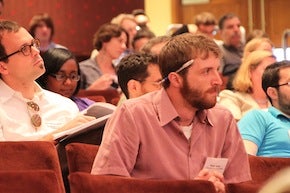Jobs, Inequality, and the Role of Government
Posted in Events | Tagged Center for Economic and Policy Research, CWA
Tuesday, October 11, 2011
1:00 to 5:00 p.m.
Georgetown University Law Center
Gewirz Student Center, 12th Floor Reception Area
120 F Street, NW, Washington, DC
Co-sponsored by:
Communications Workers of America
Center for Economic and Policy Research
Panelists and speakers:
Katharine G. Abraham, Member, Council of Economic Advisers (invited)
Dean Baker, Co-director, Center for Economic and Policy Research
Margaret Mendenhall Blair, Milton R. Underwood Chair in Free Enterprise, Vanderbilt University Law School
Abby Joseph Cohen, President of Global Markets Institute and Senior Investment Strategist, Goldman Sachs
Larry Cohen, President, Communications Workers of America
Mark Doms, Chief Economist, U.S. Department of Commerce
Richard Freeman, Professor of Economics, Harvard University and Program Director for Labor Studies, National Bureau of Economic Research
J. Erik Garr, Principal, Price Waterhouse Coopers (former General Manager, National Broadband Plan, Federal Communications Commission)
Kate Gordon, Vice President for Energy Policy, Center for American Progress
Michael Greenberger, Professor, University of Maryland School of Law (former Director, Division of Trading and Markets, Commodity Futures Trading Commission)
Matthew Keller, Assistant Professor, Southern Methodist University (Co-editor, State of Innovation: The U.S. Government’s Role in Technology Development)
James Manyika, Director, McKinsey Global Institute and Senior Partner, McKinsey & Company (invited)
Terrell McSweeny, Domestic Policy Advisor to the Vice President (invited)
Edward B. Montgomery, Dean, Georgetown Public Policy Institute
Panel 1: Competitiveness, Job Creation and Inequality
Over recent decades, the U.S. economy has been restructured at the expense of many sectors of the economy. Economic growth and job creation require that we rebalance the economy so that workers’ wages are reconnected to economy-wide productivity growth. Policies that support innovation, competitiveness, and collective bargaining and encourage value-added production and services in the U.S. can help us move from a debt-driven economy to one based on rising household incomes and wealth.
Panel 2: The Role of the Public Sector in Innovation
Public investment in research and development, education, training, and infrastructure are essential to the economic growth of the U.S., improving economic competitiveness, and increasing innovative capacity. Plans for robust public investment — in areas like broadband, health research, and clean energy — are crucial to promoting the United States’ global competitiveness.
Description and background:
Early this year, President Obama released an updated “Strategy for American Innovation” and the Department of Commerce was tasked with a comprehensive study of the economic competitiveness and innovative capacity of the United States. An Innovation Advisory Board of leaders in academia, business and labor was created to work in consultation with the Department of Commerce on this important report.
To inform the consultation process for the report, as well as the broader public debate about economic competitiveness and innovation, the Communications Workers of America – which has a seat on the Innovation Advisory Board – is co-sponsoring this conference with Georgetown University’s Kalmanovitz Initiative for Labor and the Working Poor and the Center for Economic and Policy Research.
Leading experts on the U.S. economy will discuss the crucial challenges to the nation’s competitiveness and capacity for innovation and outline an agenda for meeting those challenges.

